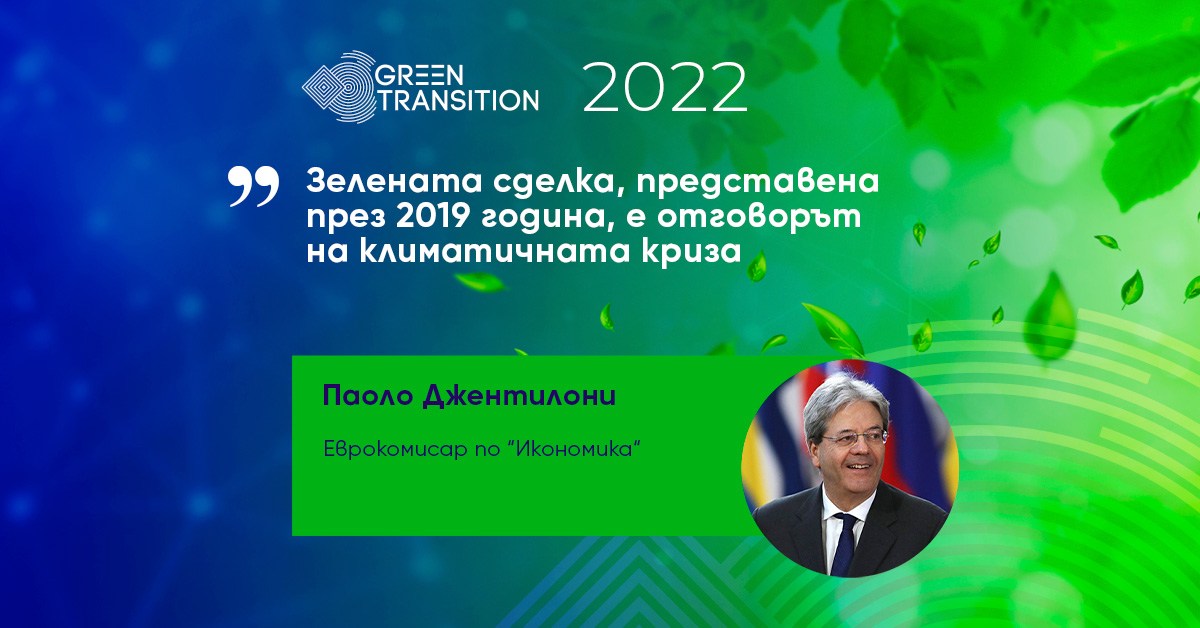The Green Deal, presented in 2019, is the answer to the climate crisis – “an ambitious plan to transform our energy system and make our continent climate neutral by 2050”. This is what the EU Commissioner for Economic and Financial Affairs Paolo Gentiloni said in his speech at the conference of Dir.bg and 3E-news Green Transition 2022: “The Green Deal – Innovation, Investment and a Just Transition”. In the words of one of the event’s special guests, who joined by video, ending dependence on Russia will cost the EU €200 billion in extra investment.
“Today this effort seems even more urgent – Russia’s war of aggression against Ukraine has added a geopolitical dimension to climate goals,” Gentiloni said.
According to him, Russia is using energy as a weapon and thus increasing uncertainty over future supplies, while also raising prices “to finance its brutal invasion and completely cut EU countries off from energy supplies”.
“Russia is no longer a reliable partner and Bulgaria knows this more than anyone”, the EU Commissioner for Financial Affairs said and continued: “Today, transforming our energy system is not only key to achieving our goals – it is also crucial for our collective security, and that means ending our dependence on Russian fossil fuels as soon as possible. That is the goal of the REPowerEU plan.”
He reminded that last month a package of proposals was presented with three main objectives – increasing energy savings, diversifying supply and accelerating the introduction of renewable energy sources. “Fossil fuel imports from Russia cost the EU nearly €100 billion a year, and Russia is using these revenues to fund the war,” the EU finance commissioner said.
“We need to limit its opportunities to do that. That is why I welcome the recent agreement among EU leaders on our proposal to impose an embargo on most Russian oil imports as part of the latest round of sanctions,” Gentiloni added.
In his words, however, ending Europe’s dependence on Russian fuels will not be cheap, but will require about 200 billion euros of additional investment over the next five years.
“This investment is added to the additional investment of more than €500 billion that we need to mobilise every year until 2030 if we are to meet the climate targets,” Gentiloni noted. He explained that we have a great need for investment, much of which is expected to come from the private sector.
“Our task is to create conditions and provide incentives to channel private capital in this direction. The EU taxonomy for sustainable finance is one example of how we can channel private sector investment towards innovative and environmentally friendly solutions,” Gentiloni said.
“But public sector investment will be just as important. At EU level, there are two programmes that will play a key role in this respect – the Next Generation EU and InvestEU,” the Commissioner said, explaining that the first programme is an unprecedented response to the pandemic and the need for effective recovery.
“Supporting the environmental transition is one of the key objectives of the Recovery and Sustainability Mechanism, which is at the heart of the EU’s Next Generation”, Paolo Gentiloni added.
In his words, Bulgaria has shown that it wants to make the most of this opportunity and almost 60% of its Recovery and Sustainability Plan is focused on climate goals.
“This means €3.7 billion in grants to decarbonise the energy sector, promote renewables and make buildings more energy efficient. With the green light the world gave last month, Bulgaria is now ready to implement its ambitious plan,” Gentiloni asserted, adding that the long-term component of the Recovery and Sustainability Facility remains available to finance the investments identified in the REPowerEU plan and to reduce dependence on Russian energy.
“Member States will have the opportunity to add a specific chapter to their recovery and sustainability plans for this purpose as soon as co-legislators reach agreement on the REPowerEU plan,” the Commissioner added.
He explained that the InvestEU programme is the second pillar and will use a guarantee from the EU budget to mobilise public and private funding through the European Investment Bank and other implementing partners. The programme is the successor of the European Fund for Strategic Investments or the so-called “Juncker Plan”, which has proved very successful in Bulgaria.
“The country ranked third in total investment as a share of GDP as a result of the plan. I am confident that the new InvestEU programme will be just as successful,” the EU Commissioner for Financial Affairs said and said that he would look forward to working with the Bulgarian Development Bank.
“As you can see, at the EU level we are presenting very significant amounts to stimulate the Green Deal. And we must be ready to consider new joint initiatives in the future,” Gentiloni appealed, adding:
“It is clear, however, that the implementation of the Green Deal will also require greater public investment, financed from national budgets. To this end, I believe we need to adapt our common fiscal rules to the challenges of the new economic and geopolitical realities”, the Commissioner was adamant.
He reported that the proposals will be presented after the end of the summer.
“Implementing the Green Transition and ending our dependence on Russia will not be easy. And we are well aware that for some regions and some industries it will be even harder. That is why we always stress that the transition must be fair. But I also believe that if we remain united and resolute, as we have been during the pandemic and the last three months, we will succeed,” Paolo Gentiloni added and concluded his speech with a quote from Prime Minister Kiril Petkov:
“If the most Russia-dependent country with the lowest GDP per capita in the EU can afford to oppose Putin, then everyone should be able to oppose Putin.”
